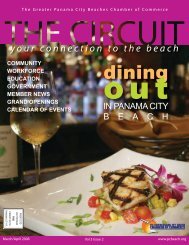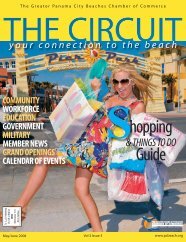View This Issue - Panama City Beach Chamber of Commerce
View This Issue - Panama City Beach Chamber of Commerce
View This Issue - Panama City Beach Chamber of Commerce
You also want an ePaper? Increase the reach of your titles
YUMPU automatically turns print PDFs into web optimized ePapers that Google loves.
THE<br />
OF THE<br />
Compiled by inc.com<br />
very entrepreneur spends<br />
some time haggling, whether<br />
it is with customers, suppliers,<br />
investors, or would-be<br />
employees. Most business<br />
owners are street smart, and<br />
seem to naturally perform<br />
well in negotiations. You probably have a<br />
trick or two—some magic phrases to say,<br />
perhaps—that can help you gain the upper<br />
hand. But, <strong>of</strong>ten, the moment you get into<br />
trouble in a negotiation is when something<br />
careless just slips out. If you are new to negotiation,<br />
or feel it is an area where you can<br />
improve, check out these tips on precisely<br />
what not to say.<br />
The word “Between”<br />
It <strong>of</strong>ten feels reasonable—and therefore like<br />
progress—to throw out a range. With a customer,<br />
that may mean saying “I can do this<br />
for between $10,000 and $15,000.” With a<br />
potential hire, you could be tempted to say,<br />
“You can start between April 1 and April<br />
15.” But that word between tends to be tantamount<br />
to a concession, and any shrewd<br />
negotiator with whom you deal will swiftly<br />
zero-in on the cheaper price or the later deadline.<br />
In other words, you will find that by<br />
saying the word between you will automatically<br />
have conceded ground without extracting<br />
anything in return.<br />
Three Principles<br />
A. Focus on people. Separate the people<br />
from the issues to avoid personalizing<br />
them. Make sure each party understands the<br />
other’s perception <strong>of</strong> what is involved. Listen<br />
actively and speak to be understood, not<br />
to argue a position.<br />
B. Focus on interests. Behind each position<br />
lie compatible interests as well as conflicting<br />
ones. Put yourself in the other person’s<br />
shoes; it’ll help you identify interests.<br />
Ask yourself: “Why does she take such a<br />
position?” “Does any aspect <strong>of</strong> my proposal<br />
conflict with those interests?”<br />
C. Focus on options. Work with the<br />
other party to generate a variety <strong>of</strong> options.<br />
Brainstorm before you start the decisionmaking<br />
process. Look for areas <strong>of</strong> agreement;<br />
you’ll find them through your shared<br />
interests. Look for ways to dovetail differing<br />
interests; explore options that are <strong>of</strong> low cost<br />
to you and high benefit to the other party, and<br />
vice versa.<br />
“Why don’t you throw<br />
out a Number?”<br />
There are differing schools <strong>of</strong> thought on this,<br />
and many people believe you should never<br />
be the first person in a negotiation to quote<br />
a price. Let the other side start the bidding,<br />
the thinking goes, and they will be forced to<br />
show their hands, which will provide you<br />
with an advantage. But some research has indicated<br />
that the result <strong>of</strong> a negotiation is <strong>of</strong>ten<br />
closer to what the first mover proposed than<br />
to the number the other party had in mind;<br />
the first number uttered in a negotiation (so<br />
long as it is not ridiculous) has the effect <strong>of</strong><br />
“anchoring the conversation.”<br />
Creating Win-Win<br />
situations<br />
Negotiating can be fun, empowering and enjoyable<br />
for both parties. It works only when<br />
all those involved feel as if they have won.<br />
Here are four ways to create negotiations<br />
where everybody comes out ahead.<br />
A. Power comes from preparation<br />
and planning, instead <strong>of</strong> trying to over-<br />
64 THE CIRCUIT September/October 2012
















